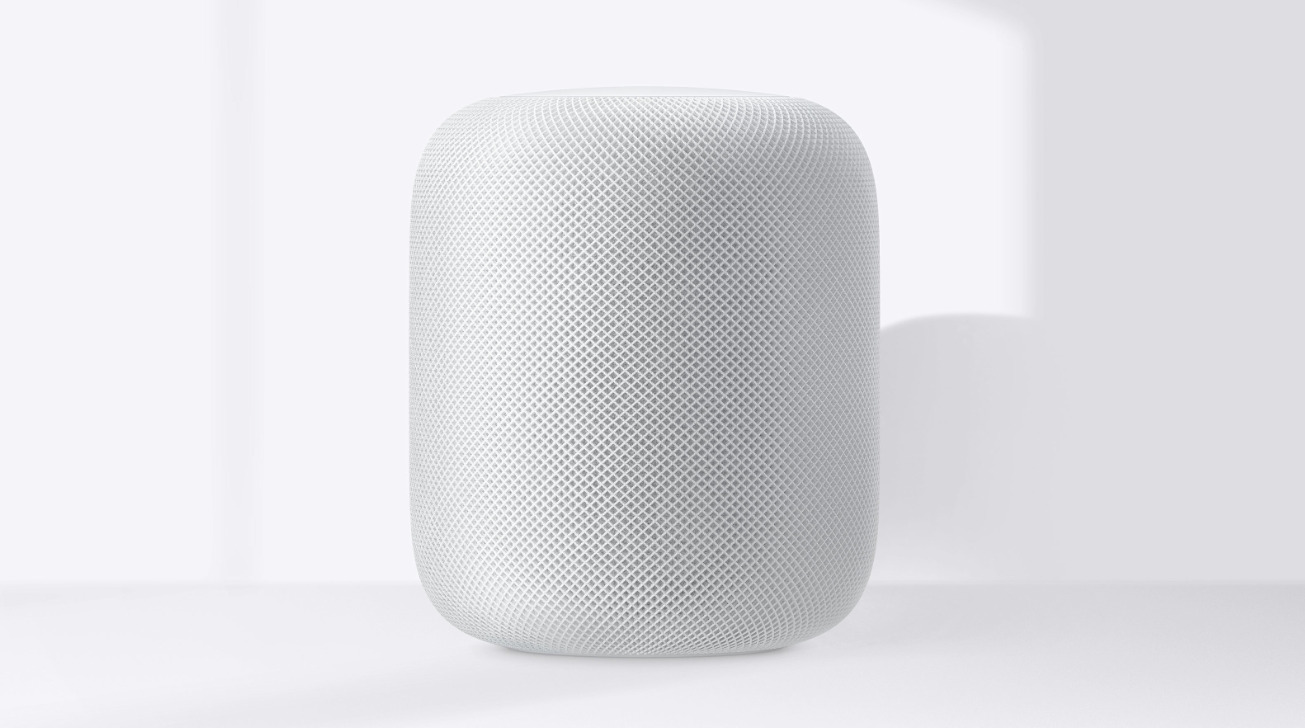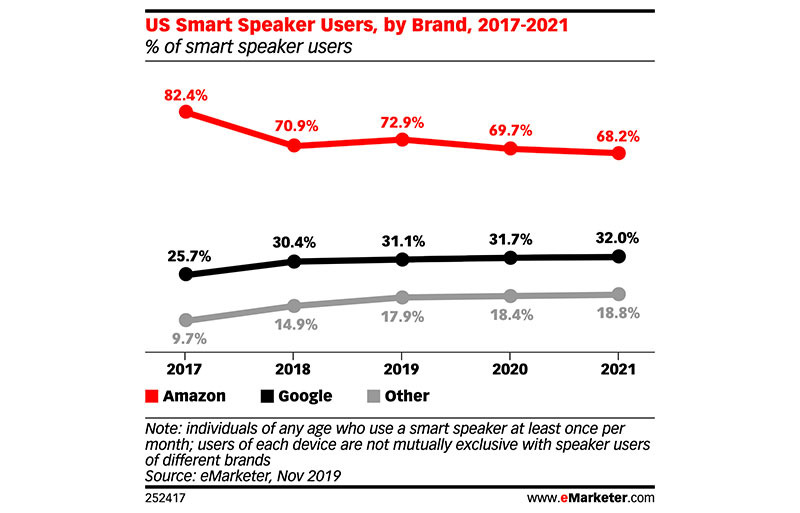Amazon's share of the U.S. smart speaker market is expected to contract slightly in 2020 and 2021, according to new research from eMarketer, but the dip is unlikely to faze the e-tailer whose popular Alexa-powered Echo devices enjoy a commanding lead over segment competitors Google and Apple.
The latest estimates from eMarketer, released on Monday, put Amazon's U.S. marketshare at 72.9% in 2019, up 2% from the year prior. That figure is expected to decline to 69.7% in 2020 and 68.2% in 2021 as more consumers buy into the market, loosening the online retailer's stranglehold.
Still, Amazon's current and predicted marketshare more than doubles that of its closest challenger Google, which held a 31.1% piece of the pie in 2019. The search giant is expected to see its stake increase to 31.7% and 32% in 2020 and 2021, respectively.
Google's estimated growth mirrors that of "other" manufacturers and individual product lines, a group of smaller players that includes Apple's HomePod, Harmon Kardon's Invoke and Sonos One. Last year, some 17.9% of smart speaker users owned a device that falls into the catchall category, a figure expected to increase to 18.4% in 2020 and 18.8% in 2021, according to eMarketer.
"Since Amazon first introduced the Echo, it has built a convincing lead in the U.S. and continues to beat back challenges from top competitors," said Victoria Petrock, a principal analyst at eMarketer. "We had previously expected Google and Apple to make more inroads in this market, but Amazon has remained aggressive. By offering affordable devices and building out the number of Alexa skills, the company has maintained Echo's appeal."
In the U.S., eMarketer sees the smart speaker market to grow to 83.1 million users this year, up 13.7% year-over-year. Growth is anticipated to fall into the single digits in 2021.
CIRP in a report last year also estimated Amazon to command roughly 70% of the U.S. smart speaker segment on the back of a wide range of Echo offerings. Apple, which fields one premium product in HomePod, accounted for an estimated 6% of the market.
 AppleInsider Staff
AppleInsider Staff





-xl-m.jpg)


-m.jpg)






 Amber Neely
Amber Neely
 William Gallagher
William Gallagher
 Malcolm Owen
Malcolm Owen

 Mike Wuerthele
Mike Wuerthele


 Thomas Sibilly
Thomas Sibilly








53 Comments
I don’t know anyone with a HomePod. Sounds like the number 17.9% is a little high even with the sales they have had. I’m often surprised by the number of non-techie people have an echo. Has Apple published any numbers in the last year on the number of HomePods sold.
I would not be surprised if a lot of them sold were stereo pairs at Christmas.
I’m surprised it’s this close.
The HomePod is an exceptional audio listening device that also happens to support voice interaction. Primary emphasis is audio performance.
The Echo is a device with exceptional voice interaction that also happens to play audio. Primary emphasis is voice interaction performance.
Frankly, I could not be happier than to be able to put an Echo device in just about every room of my house, including the garage and utility spaces. I can listen to podcasts, radio stations, and my Apple Music with reasonably decent (inexpensive boom box level) audio quality while I work or do household chores. When I want to kick back and immerse myself into my personal music collection, it's time for the HomePod or headphones. When you really care about how it sounds, the HomePod rules. If it's background filling audio, the Echo (especially the larger ones) are perfectly fine. Having access to Apple Music across both families of devices is totally awesome.
I really hope the rumors of an “HomePod Mini” turn out to be true. HomeKit works so much better for me than Alexa. I’m constantly having to reset Alexa and re-add my Hue lights. Then once i actually do get it connected again, it doesn’t recognize the command.
Alexa: “Do you mean Hue white lamp 5?”
Me: Grrr..!!!!!!
Only reason I use Alexa at all is because of price. I suspect most people who buy Echo devices buy for that same reason. $25 gets you a voice assistant/smart speaker for every room. I can’t afford to put $300 HomePods in all the rooms of my house. Even if the HomePod Mini was still $99, that would be low enough for me to ditch Alexa.
Has anyone at AI read DED's essays published in AppleInsider that explain the folly of comparing products like Echo to Apple's HomePod. Not the same things at all.
It's like a Fitbit is a competitor to Apple Watch because they both occupy wrist space and are digital devices.